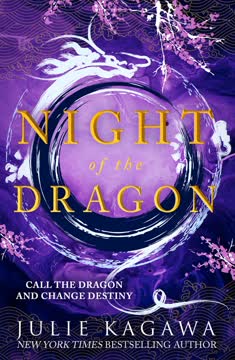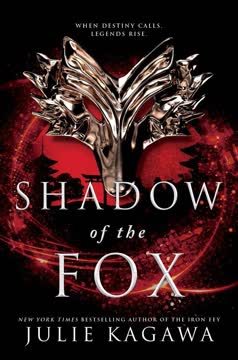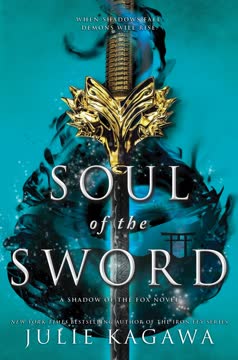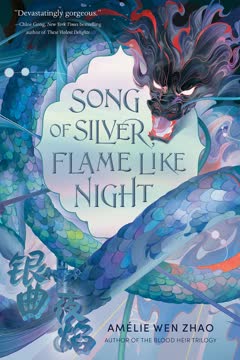Plot Summary
Summoning Shadows and Betrayals
A thousand years ago, the immortal Lady Hanshou summons Hakaimono, the First Oni, from Jigoku, seeking the Dragon scroll to claim the ultimate Wish. Her champion, Kage Hirotaka, betrays her, setting in motion a cycle of vengeance and ambition. In the present, the Master of Demons, Genno, has gathered the pieces of the Dragon scroll, threatening to summon the Harbinger and end the empire. The story's foundation is laid in blood, betrayal, and the dangerous allure of power, as both mortals and demons are drawn into a game that will decide the fate of the world.
Exiles and Uncertain Selves
Tatsumi, once a loyal Kage demonslayer, is now fused with Hakaimono, neither wholly human nor demon. Banished from the Tengu's mountain, he and his companions—Yumeko the kitsune, Reika the shrine maiden, Daisuke the noble, Okame the ronin, and Chu the guardian dog—must pursue Genno to stop the Summoning. Tatsumi's internal battle mirrors the group's external dangers, as trust is tested and the lines between friend and foe blur. Yumeko's unwavering faith in Tatsumi's soul becomes a fragile anchor as they journey toward the coast, hunted by their own pasts.
Night Assaults and Old Ties
As the group shelters in a cave, Kage shinobi attack, sent by Lady Hanshou to eliminate witnesses. Tatsumi faces Ayame, a childhood friend turned assassin, forced to watch her die by her own hand rather than betray her clan. The group barely survives a coordinated assault, their bonds deepened by shared trauma. The cost of survival is high, and the threat of betrayal—both from within and without—haunts every step. The journey becomes not just a race against Genno, but a struggle to hold onto their humanity.
Cursed Village, Cursed Fate
Arriving at a coastal village, the group finds it overrun by the smiling dead—corpses animated by blood magic. The survivors, desperate and terrified, beg for help. Yumeko's fox magic allows the group to disguise themselves and infiltrate the docks, where a coven of blood mages sustains the curse. In a harrowing battle, they destroy the witches, freeing the village and earning passage to the Moon Clan islands. The victory is bittersweet, a reminder that every step forward is paid for in blood and sacrifice.
Foxfire and Blood Magic
Yumeko's illusions allow the group to bypass the undead, but the confrontation with the blood mages is brutal. The mages animate grotesque mounds of corpses, nearly overwhelming the heroes. Only by combining shrine magic, foxfire, and desperate teamwork do they shatter the barrier and slay the witches. The cost is exhaustion and the knowledge that Genno's power grows. Yet, hope flickers as they secure a ship and set sail, the bonds between them tested and strengthened by shared ordeal.
Sea Monsters and Shipwrecks
Aboard the Seadragon's Fortune, the group faces the umibozu, a monstrous sea spirit. The ship is destroyed, scattering the companions. Tatsumi and Yumeko wash ashore, Yumeko gravely wounded. In the sacred forest, Tatsumi's plea to the kodama and the appearance of the Kirin—a holy beast—save Yumeko's life. Their journey through the enchanted woods is a crucible of love, loss, and the realization that their fates are entwined with forces far greater than themselves.
Lost in the Sacred Forest
Yumeko hovers between life and death, guided by visions of her old master and the Kirin. She is told her time has not yet come, and that she must seek out Tsuki Kiyomi, the Moon Clan daimyo. Tatsumi, desperate and alone, is granted a night of peace by the Kirin, and the two are reunited, their love deepened by the ordeal. Guided by a mysterious two-tailed kitsune, they reach the Moon Clan capital, where the city's harmony between humans, yokai, and kami offers a glimpse of what peace could be.
Reunion in the Moon City
In Shinsei Yaju, the group is reunited. The city's acceptance of yokai and spirits is a balm, but also a reminder of what is at stake. The Moon Clan daimyo, Kiyomi, is revealed to be Yumeko's mother, lost to her by a web of deception and supernatural intrigue. The revelation is both a blessing and a burden, as Yumeko must reconcile her past with her destiny. The group prepares for the final confrontation, their bonds tested by truth, grief, and the looming threat of Genno's army.
Mother and Daughter Revealed
Yumeko learns the truth of her parentage: her father was a yokai who deceived Kiyomi, and she was stolen as an infant. The reunion is fraught with sorrow and hope, as Kiyomi vows to aid her daughter and the companions in the coming battle. The Moon Clan, long neutral, is drawn into the conflict, and the stage is set for a last stand against Genno. The personal and the epic intertwine, as Yumeko's quest becomes not just about saving the empire, but reclaiming her own identity and family.
Night of Confessions
On the eve of battle, confessions and goodbyes are shared. Daisuke and Okame, their love finally spoken, prepare for a glorious death together. Tatsumi and Yumeko, in a moment of fox magic and moonlight, share their hearts and bodies, knowing the dawn may bring separation or death. The group's unity is both their greatest strength and their deepest vulnerability, as each prepares to face the darkness in their own way.
Demons at the Gates
Genno's army of demons and yokai assaults the Moon Clan capital. The companions fight desperately to protect the daimyo and the people. Reika, the shrine maiden, gives her life to hold the barrier against the monstrous Orochi and the scorpion twins, allowing Kiyomi to call the Kirin for aid. The city is saved, but at a terrible cost. The kami flee the land, the gates to Jigoku open, and the world teeters on the brink of annihilation.
The Valley of Lightning
The Moon and Shadow Clans unite to face the endless horde pouring from Jigoku. The companions, guided by the ghost Suki, take a hidden path beneath the valley, seeking to bypass the demonic army and reach the Summoning site. The battle above is desperate, a last stand against impossible odds. The companions descend into the underworld, where grief and rage have taken monstrous form.
Descent into the Underworld
In the caves, the group faces a kijo—a demoness born of Kiyomi's grief and rage. Only Yumeko, revealing herself as Kiyomi's daughter, can break the curse and free the spirit. The true architect of their suffering is revealed: Seigetsu, the mysterious silver-haired figure, is a ninetailed kitsune and Yumeko's father. His centuries-long game has manipulated mortals and immortals alike, all for the sake of claiming the Dragon's jewel and godhood.
The Kijo's Curse
Seigetsu's machinations come to light as he claims the Fushi no Tama, the Dragon's jewel of immortality. The companions, battered and grieving, press on to the Summoning site, where Genno prepares to call the Dragon. The final obstacles—demonic generals and old enemies—demand the ultimate sacrifices. Daisuke and Okame fall in battle, their love and courage immortalized in legend.
The Ninetails' True Game
At the peak, Genno is defeated, but Seigetsu's true plan is revealed. He corrupts the Dragon, unleashing a god driven mad by grief and rage. Lady Hanshou, transformed by her own curse, confronts the Dragon and is destroyed. Tatsumi, wielding Kamigoroshi, slays the Harbinger, but Seigetsu seizes the jewel, becoming a godlike Ninetail. In a final, brutal confrontation, Tatsumi sacrifices himself to destroy Seigetsu, ending the threat but paying the ultimate price.
The Dragon's Summoning
With the Dragon dead and the gates to Jigoku open, the world teeters on the edge of destruction. Yumeko, alone and bereft, must choose whether to use the Wish. The spirits of her friends, guided by Suki, return to aid her in one last stand against the demonic horde. Hakaimono, finally freed from Kamigoroshi, chooses to return to Jigoku, his long torment ended.
The Godslayer's Price
Yumeko reaches the dying Dragon, the Fushi no Tama in hand. Tatsumi's spirit, refusing immortality, urges her to restore the Harbinger. In a moment of selfless love, Yumeko returns the jewel, reviving the Dragon and earning the right to make the Wish. The cost is the loss of all she holds dear, but the world is saved from annihilation.
The Last Wish
Granted the Wish, Yumeko chooses not to restore her friends or claim happiness, but to close the gates of Jigoku and return all demons and spirits to their rightful realms. The world is saved, the curse of Kamigoroshi is broken, and the cycle of suffering ends. The spirits of her friends bid her farewell, promising to find her again in another life. Yumeko, alone but at peace, is left to carry their memory and the hope of reunion.
Dawn and Remembrance
In the aftermath, the Moon Clan and the empire rebuild. Yumeko, now heir to the Tsuki, finds a home and a family, but the ache of loss remains. Years pass, and the legend of the wandering fox grows. On the hundredth anniversary of the Night of the Dragon, as lanterns float down the river, Yumeko glimpses a familiar face across the water—a promise kept, and the hope that love and friendship endure beyond death and time.
Characters
Yumeko
Yumeko, a half-kitsune raised in a temple, is the heart of the story. Her journey from naive trickster to self-sacrificing hero is marked by unwavering compassion, cleverness, and a growing sense of responsibility. Her fox magic, rooted in illusion and empathy, becomes a tool for both survival and healing. Yumeko's relationships—with Tatsumi, her found family, and her estranged mother—drive her growth. She is haunted by questions of identity and fate, manipulated by powers beyond her understanding, yet ultimately claims agency through her choices. Her final act—using the Wish for the world, not herself—cements her as a hero defined by love, humility, and hope.
Tatsumi / Hakaimono
Tatsumi, the Kage demonslayer, is a study in duality. Fused with Hakaimono, the First Oni, he is both weapon and victim, struggling to reconcile human emotion with demonic rage. His journey is one of self-discovery, as he learns to accept love, vulnerability, and the possibility of redemption. His relationship with Yumeko is transformative, awakening a humanity he was trained to suppress. Hakaimono, once a force of destruction, is shaped by Tatsumi's influence, ultimately choosing freedom over vengeance. Their final sacrifice—destroying Seigetsu and refusing immortality—embodies the series' themes of agency, love, and the cost of power.
Seigetsu / The Ninetail
Seigetsu, the enigmatic silver-haired figure, is revealed as a ninetailed kitsune and Yumeko's father. His centuries-long game, orchestrating events to claim the Dragon's jewel and godhood, is both brilliant and monstrous. Seigetsu embodies the dangers of unchecked ambition and the loneliness of immortality. His manipulation of mortals and immortals alike is driven by a desire to reshape the world, but his inability to understand love and sacrifice is his undoing. In the end, he is defeated not by strength, but by the very humanity he sought to transcend.
Kiyomi
Tsuki Kiyomi, daimyo of the Moon Clan and Yumeko's mother, is a figure of sorrow and resilience. Betrayed by love, haunted by loss, her grief becomes a curse that infects the land. Her reunion with Yumeko is both healing and bittersweet, as she must let her daughter go to fulfill her destiny. Kiyomi's arc is one of acceptance—of pain, of change, and of the need to trust others. Her willingness to fight for her people, even at great personal cost, marks her as a leader shaped by both tragedy and hope.
Reika
Reika, the shrine maiden, is the group's moral compass and spiritual strength. Fiercely protective, skeptical of demons and foxes, she nonetheless grows to trust and love her companions. Her sacrifice to protect the Moon Clan is a turning point, embodying the series' themes of duty, friendship, and the cost of heroism. Even in death, Reika's spirit guides and supports Yumeko, a testament to the enduring power of love and faith.
Daisuke
Taiyo Daisuke, scion of the Sun Clan, is a paragon of honor and self-reflection. His journey is one of questioning the contradictions of bushido, seeking a glorious death, and ultimately finding purpose in love and friendship. His relationship with Okame, the ronin, is a rare and beautiful portrayal of queer love in a fantasy setting—tender, tragic, and deeply human. Daisuke's final stand against the oni general is both a fulfillment of his ideals and a testament to the power of chosen family.
Okame
Okame, the ronin, is the group's heart and comic relief, masking pain and insecurity with bravado. His journey from self-serving outcast to selfless hero is marked by loyalty, humor, and a fierce love for his companions—especially Daisuke. Okame's willingness to die for his friends, and his final moments with Daisuke, are among the story's most poignant. He represents the possibility of redemption and the value of every soul, no matter how lost.
Suki
Suki, the spirit of a palace maid, is both observer and participant, her love for Daisuke and desire to help giving her purpose beyond death. Her role as Seigetsu's unwitting pawn and eventual guide for the souls of the dead highlights the story's themes of fate, agency, and the enduring bonds of love. Suki's gentle presence and final act of leading her friends' spirits to Yumeko in the underworld is a quiet, powerful act of grace.
Lady Hanshou
Lady Hanshou, the Shadow Clan daimyo, is a study in the corrupting power of ambition and immortality. Her use of blood magic, manipulation of Tatsumi, and ultimate transformation into a monstrous being are both horrifying and pitiable. Hanshou's fate is a warning against the pursuit of power at any cost, and her final confrontation with the Dragon is both a reckoning and a release.
Genno
Genno, the blood mage who seeks to summon the Dragon, is the story's immediate antagonist—a figure of ambition, cunning, and cruelty. Yet, he is ultimately revealed as a pawn in Seigetsu's greater game, his quest for power leading only to destruction and damnation. Genno's arc is a cautionary tale about the dangers of unchecked desire and the futility of seeking control over forces beyond comprehension.
Plot Devices
Duality and Merging of Souls
The fusion of Tatsumi and Hakaimono is the narrative's central device, exploring the tension between duty and desire, rage and compassion, self and other. This duality is mirrored in Yumeko's own struggle with her kitsune nature and her longing for belonging. The merging and eventual separation of souls is both literal and metaphorical, driving character growth and the story's emotional stakes.
The Quest and the MacGuffin
The journey to prevent the Summoning is structured as a classic quest, with the Dragon scroll as the object of desire for heroes and villains alike. The scroll's power to grant a Wish is both a temptation and a test, revealing the true nature of those who seek it. The quest structure allows for episodic challenges—cursed villages, sea monsters, underworld caves—each serving as a crucible for character and theme.
Illusion, Deception, and Fox Magic
Yumeko's fox magic, rooted in illusion, becomes a metaphor for the power of belief, the danger of deception, and the necessity of hope. Illusions are used for survival, for battle, and ultimately to defeat the Ninetail, whose own mastery of trickery is undone by Yumeko's growth. The motif of illusion underscores the story's exploration of truth, agency, and the blurred lines between good and evil.
Cycles of Betrayal and Redemption
The narrative is structured around cycles—of betrayal, vengeance, and sacrifice. The sins of the past (Hanshou's summoning, Kiyomi's loss, Seigetsu's schemes) echo in the present, but the characters' choices—especially Yumeko's selfless Wish—offer the possibility of breaking the cycle. Foreshadowing, callbacks, and mirrored events reinforce the theme that destiny is shaped by both fate and free will.
The Power and Price of Wishes
The Wish is both a literal and symbolic device, representing the allure and danger of unchecked desire. The story interrogates what it means to wish for oneself versus for others, and the cost of changing the world. The final Wish, used not for personal gain but for the greater good, is a subversion of fantasy tropes and a meditation on the true nature of heroism.
Analysis
Night of the Dragon is a masterful conclusion to a trilogy that weaves Japanese mythology, epic fantasy, and deeply human emotion into a tale of sacrifice, love, and the struggle for agency in a world shaped by gods and monsters. Julie Kagawa's narrative interrogates the nature of power—who deserves it, who is corrupted by it, and what it means to wield it responsibly. The story's heart lies in its characters, whose growth is forged in the crucible of loss and hope. Yumeko's journey from naive trickster to selfless savior is a testament to the power of compassion and humility, while Tatsumi's struggle with his own darkness is a moving exploration of redemption. The novel's use of mythic structure—quests, curses, wishes—serves not as mere ornament, but as a vehicle for exploring the costs of ambition, the necessity of letting go, and the enduring strength of chosen family. In the end, Night of the Dragon is a story about the choices that define us, the bonds that sustain us, and the hope that, even in the face of overwhelming darkness, we can choose to be the light.
Last updated:
Review Summary
Night of the Dragon concludes Julie Kagawa's Shadow of the Fox trilogy to widespread acclaim. Readers praise the thrilling action, emotional depth, and satisfying conclusion. Many were moved to tears by the bittersweet ending and character fates. The Japanese mythology-inspired world-building and character development receive particular praise. While some found parts overwhelming or wished for more romance, most consider it a strong finale that skillfully balances action, heart, and cultural elements. Fans express sadness at saying goodbye to beloved characters but feel the series ended on a high note.









